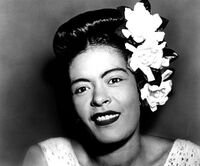Billie Holiday
Relevance
Mentioned In
Discogs Information
Profile
Billie Holiday (born April 7, 1915, Philadelphia, Pennsylvania, USA - died July 17, 1959, New York City, New York, USA) was an American jazz singer and songwriter.
Daughter of jazz guitarist Clarence Holiday. Godmother of Mala Waldron and Lorraine Feather.
She made her debut circa 1930 singing in various nightclubs in Harlem. In early 1933, the producer John Hammond heard her sing and was impressed by her talent. In 1935 he signed her to Brunswick Records. She made her first recordings with Benny Goodman. Also in 1935 she made her first appearance in a movie, with more roles in the 1940's. From 1939 she started recording songs with notable jazz artists of that time. In the 1950's, her voice was deteriorating as a result of unhappy relationships, heroin use and excessive drinking. In May 1959 she collapsed and was taken to the Metropolitan Hospital in New York City for treatment of liver and heart disease. She was arrested for heroin possession while she lay dying.
She was inducted into the Blues Hall of Fame in 1991 and the Rock And Roll Hall of Fame in 2000 (Early Influence).
External Links
- https://www.discogs.com/artist/33589-Billie-Holiday
- https://billieholiday.com/
- https://www.ladyday.net/
- https://en.wikipedia.org/wiki/Billie_Holiday
- https://www.britannica.com/biography/Billie-Holiday
- https://reset.me/story/how-billie-holiday-was-hunted-down-in-the-early-days-of-the-war-on-drugs/
- https://www.imdb.com/name/nm0390507/
- https://www.biography.com/musician/billie-holiday
- https://www.treccani.it/enciclopedia/billie-holiday/
- https://www.jazzdisco.org/billie-holiday/discography/
Wikipedia Information
 |
Billie Holiday (born Eleanora Fagan; April 7, 1915 – July 17, 1959) was an American jazz and swing music singer. Nicknamed "Lady Day" by her friend and music partner, Lester Young, Holiday made a significant contribution to jazz music and pop singing. Her vocal style, strongly influenced by jazz instrumentalists, inspired a new way of manipulating phrasing and tempo. She was known for her vocal delivery and improvisational skills.After a turbulent childhood, Holiday began singing in nightclubs in Harlem, where she was heard by producer John Hammond, who liked her voice. She signed a recording contract with Brunswick in 1935. Collaborations with Teddy Wilson produced the hit "What a Little Moonlight Can Do", which became a jazz standard. Throughout the 1930s and 1940s, Holiday had mainstream success on labels such as Columbia and Decca. By the late 1940s, however, she was beset with legal troubles and drug abuse. After a short prison sentence, she performed at a sold-out concert at Carnegie Hall. She was a successful concert performer throughout the 1950s with two further sold-out shows at Carnegie Hall. Because of personal struggles and an altered voice, her final recordings were met with mixed reaction but were mild commercial successes. Her final album, Lady in Satin, was released in 1958. Holiday died of heart failure on July 17, 1959, at age 44. Holiday won four Grammy Awards, all of them posthumously, for Best Historical Album. She was inducted into the Grammy Hall of Fame and the National Rhythm & Blues Hall of Fame. In 2000, she was also inducted into the Rock & Roll Hall of Fame as an early influence; their website states that "Billie Holiday changed jazz forever". She was named one of the 50 Great Voices by NPR; and was ranked fourth on the Rolling Stone list of "200 Greatest Singers of All Time" (2023). Several films about her life have been released, most recently The United States vs. Billie Holiday (2021).
